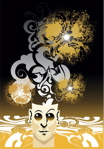Can a brain fitness program help me become more creative?
 Here is question 20 from Brain Fitness 101: Answers to Your Top 25 Questions.
Here is question 20 from Brain Fitness 101: Answers to Your Top 25 Questions.
Question:
Can a brain fitness program help me become more creative?
Key Points:
- Creativity can be trained, like other mental muscles.
- Set up structured time, places, or routines that provide a framework for creativity to happen.
- Reducing your stress helps to keep your brain more flexible.
- Using many parts of the brain as well as trying new things will stimulate the areas of your brain involved in creativity.
Answer:
Yes. As with all forms of brain exercise, creativity takes consistent effort, organization, and commitment. It is hard to be creative if you work without any structure. This structure can take many forms: daily routines, limited distractions, or a record of the steps you took to get from the beginning to the end of a project or idea.
Idea generation and creative drive originate in interactions between the frontal lobes, other parts of the neocortex, and the limbic system. Positron-emission tomography (PET) scans of people’s brains during creative tasks suggests that creativity arises largely from the “association cortex† parts of the frontal, parietal and temporal lobes that integrate sensory and other information. Frontal lobe damage usually decreases idea generation, in part because of mental rigidity.
The frontal lobes and other parts of the neocortex can be exercised by a variety of activities and shut down with stress. Try making close observations of a specific item or imagine being someone else  try to experience life in those shoes. Do less of the passive things in life, like watching television and do more activities that challenge you to be original. Try new things.
Further Reading
- Cruzan Morton, Carol. Brain Regions May Sap or Spur Creativity. Focus: News from Harvard Medical, Dental, & Public Health Schools. December 12, 2003.
- De Bono, Edward. Lateral Thinking: Creativity Step by Step. (Harper Paperbacks; 1973). ISBN 0060903252.
- McConathy DA. Theories of creativity. J Biocommun. 1990;17:11–5.
- Schwartz, Jeffrey and Begley, Sharon. The Mind and the Brain: Neuroplasticity and the Power of Mental Force. (Regan Books; 2003). ISBN 0060988479.
- Tharp, Twyla. The Creative Habit: Learn it and Use it for Life. (Simon & Schuster; 2003). ISBN 0743235266.
- Zull, James. The Art of Changing the Brain: Enriching the Practice of Teaching by Exploring the Biology of Learning. (Stylus Publishing; 2002). ISBN 1579220541.


